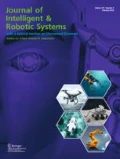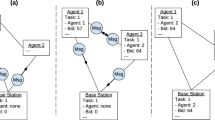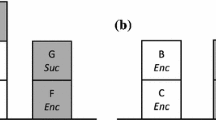Abstract
DEMiR-CF is a generic framework designed for a multirobot team to efficiently allocate tasks among themselves and achieve an overall mission. In the design of DEMiR-CF, the following issues were particularly investigated as the design criteria: efficient and realistic representation of missions, efficient allocation of tasks to cooperatively achieve a global goal, maintenance of the system coherence and consistency by the team members, detection of the contingencies and recover from various failures that may arise during runtime, efficient reallocation of tasks (if necessary) and reorganization of team members (if necessary). DEMiR-CF is designed to address different types of missions from the simplest to more complex ones, including missions with interrelated tasks and multi-resource (robot) requirements. Efficiency of the framework is validated through experiments in three different types of domains.
Similar content being viewed by others
References
Alami, R., Botelho, S.C.: Plan-based multi-robot cooperation. In: Advances in Plan-Based Control of Robotic Agents (2001)
Alami, R., Ingrand, F., Qutub, S.: A scheme for coordinating multi-robot planning activities and plans execution. In: Thirteenth European Conference On Artificial Intellingence (1998)
ALWSE-MC: http://nswcpc.navsea.navy.mil/analysis/capabilities.asp (2009)
Balch, T., Arkin, R.C.: Communication in reactive multiagent systems. Auton. Robots 1(1), 1–25 (1994)
Botelho, S., Alami, R.: M+: a scheme for multi-robot cooperation through negotiated task allocation and achievement. In: IEEE Intl. Conf. on Robotics and Automation (ICRA) (1999)
Brucker, P.: Scheduling Algorithms. Springer, New York (2001)
Brucker, P.: Scheduling and constraint propagation. Discrete Appl. Math. 123, 227–256 (2002)
Brucker, P., Knust, S.: Complex Scheduling. Springer, New York (2006)
CPLEX Manual: ILOG-CPLEX-9.0-UserMan. http://elib.zib.de/pub/Packages/mp-testdata/tsp/tsplib/tsp/index.html (2009)
Dahl, T.S., Mataric, M.J., Sukhatme, G.S.: Emergent robot differentiation for distributed multi-robot task allocation. In: Distributed Autonomous Robotic Systems (DARS) (2004)
DEMiR-CF Scenarios: Khepera II DEMiR-CF Videos. http://web.itu.edu.tr/sariel/videos/KheperaII-Movies.html (2009)
desJardins, M., Durfee, E., Ortiz, C., Wolverton, M.J.: Survey of research in distributed, continual planning. AI Mag. 20(4), 13–22 (1999)
Dias, M.: Traderbots: A New Paradigm for Robust and Efficient Multirobot Coordination in Dynamic Environments. Phd thesis, Robotics Institute, Carnegie Mellon University (2004)
Dias, M., Zinck, M., Zlot, R.M., Stentz, A.: Robust multirobot coordination in dynamic environments. In: IEEE Intl. Conf. on Robotics and Automation (ICRA) (2004)
Dias, M.B., Zlot, R.M., Kalra, N., Stentz, A.: Market-based multirobot coordination: a survey and analysis. Proc. IEEE 94(7), 1257–1270 (2006)
Finin, T., Labrou, Y., Mayfield, J.: KQML as an Agent Communication Language. MIT Press, Cambridge. Chap Software Agents (1997)
FIPA ACL: FIPA ACL Message Structure Specification. http://www.fipa.org/specs/fipa00061/SC00061G.pdf (2002)
Gancet, J., Hattanberger, G., Alami, R., Lacroix, S.: Task planning and control for a multi-uav system: Architecture and algorithms. In: IEEE/RSJ Intl. Conf. on Intelligent Robots and Systems (IROS) (2005)
Gerkey, B., Mataric, M.J.: Sold!: Auction methods for multirobot coordination. IEEE Trans. Robot. Autom. 18(5), 758–768 (2002)
Gerkey, B., Mataric, M.J.: A formal analysis and taxonomy of task allocation. Int. J. Rob. Res. 23(9), 939–954 (2004)
Horling, B., Lesser, V.: A survey of multi-agent organizational paradigms. Knowl. Eng. Rev. 19(4), 281–316 (2005)
Lemaire, T., Alami, R., Lacroix, S.: A distributed task allocation scheme in multi-uav context. In: IEEE Intl. Conf. on Robotics and Automation (ICRA) (2004)
Ossowski, S.: Co-ordination in Artificial Agent Societies, Social Structure and Its Implications for Autonomous Problem-Solving Agents. Springer, New York (1999)
Paquet, S.: Distributed Decision-Making and Task Coordination in Dynamic, Uncertain and Real-Time Multiagent Environments. Phd thesis, Laval University, Quebec (2006)
Parker, L.E.: Alliance: An architecture for fault tolerant multi-robot cooperation. IEEE Trans. Robot. Autom. 14(2), 220–240 (1998)
Parker, L.E., Tang, F.: Building multi-robot coalitions through automated task solution synthesis. Proc. IEEE (Special Issue on Multi-Robot Systems) 94(7), 1289–1305 (2006)
Pinedo, M.L.: Planning and Scheduling in Manufacturing and Services. Springer, New York (2005)
Reinelt, G.: The Traveling Salesman: Computational Solutions for TSP Applications. Springer, New York (1994)
Sariel, S.: An Integrated Planning, Scheduling and Execution Framework for Multi-Robot Cooperation and Coordination. Phd thesis, Istanbul Technical University, Turkey (2007)
Sariel, S., Balch, T., Erdogan, N.: Incremental multi-robot task selection for resource constrained and interrelated tasks. In: IEEE/RSJ Intl. Conf. on Intelligent Robots and Systems (IROS) (2007)
Sariel, S., Balch, T., Erdogan, N.: Naval mine countermeasure missions: a distributed, incremental multirobot task selection scheme. IEEE Robot. Autom. Mag. 15(1), 45–52 (2008)
Sariel, S., Balch, T., Erdogan, N.: Multiple traveling robot problem: A solution based on dynamic task selection and robust execution. IEEE/ASME Trans. Mechatron. 14(2), 198–206 (2009)
Shehory, O., Kraus, S.: Methods for task allocation via agent coalition formation. Artif. Intell. 101, 165–200 (1998)
Smith, R.G.: The contract net protocol: high level communication and control in a distributed problem solver. IEEE Trans. Comput. 29(12), 1104–1113 (1980)
Toth, P., Vigo, D.: The Vehicle Routing Problem. Society for Industrial and Applied Mathematics, Philadelphia (2001)
Vig, L., Adams, J.A.: Issues in multi-robot coalition formation. In: Multi-Robot Systems. From Swarms to Intelligent Automata, vol. III, pp. 15–26 (2005)
WEBOTS: Webots User Guide (2009)
Weglarz, J.: Project Scheduling: Recent Models, Algorithms and Applications. Kluwer, Dordrecht (1999)
Zlot, R., Stentz, A.: Market-based multirobot coordination for complex tasks. Int. J. Rob. Res. 25(1), 73–101 (2006)
Author information
Authors and Affiliations
Corresponding author
Rights and permissions
About this article
Cite this article
Sariel-Talay, S., Balch, T.R. & Erdogan, N. A Generic Framework for Distributed Multirobot Cooperation. J Intell Robot Syst 63, 323–358 (2011). https://doi.org/10.1007/s10846-011-9558-4
Received:
Accepted:
Published:
Issue Date:
DOI: https://doi.org/10.1007/s10846-011-9558-4




